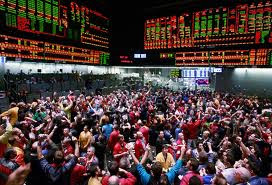With their often haughty attitudes and tendency to focus on short-term profits in the (unfortunately) correct belief that they are too big too fail, banks are easy targets for regulators and critics of capitalism-slash-globalism alike. However, I believe that there are still grey areas and that banker-bashing is not a morality play. It was perhaps inevitable after going after price-fixing in reference-rate (LIBOR) setting that regulators' attention would turn from money markets to the mother of all markets--foreign exchange. This time, the dragnet is not just led by US or UK regulators. Befitting the forex market's global reach, regulators the world over are closing in:
In any event, the much more informal nature of interaction among FX traders is what is causing regulators to look into "collusion":
At least six authorities globally – the European Commission, Switzerland’s markets regulator Finma and the country’s competition authority Weko, the UK’s Financial Services Authority, the Department of Justice in the US and the Hong Kong Monetary Authority – are looking into allegations that bankers colluded to move the currencies market.Anti-globalization activists and Occupy Wall Street flunkies enjoy using gross figures (to paraphrase Carl Sagan, trilyuns and trilyuns) to cast the foreign exchange market as an enormous manifestation of financial depravity with no clear social purpose. Believe it or not, I myself question the benefits of sending money back and forth without a corresponding need for foreign exchange for "real" purposes such as settling trade in goods and services. My point though is that if you recognize that money is not really changing hands long-term but merely goes back and forth, volume in the foreign exchange market is much less impressive. Especially when you realize it's mostly just large banks buying and selling currencies among one another in 5-10 million dollar trades. Absent unusual circumstances, banks' positions generally square at the end of the trading day.Banks including UBS, Deutsche Bank, Citigroup, Barclays, HSBC, Royal Bank of Scotland, JPMorgan and Credit Suisse have launched internal probes or received requests for information from regulators, according to people familiar with the situation. “This is an industry-wide issue,” a top executive at a large European bank says. “It is very complex but what is clear is that there are more than just a few big market players involved.”
In any event, the much more informal nature of interaction among FX traders is what is causing regulators to look into "collusion":
The probes hit a business area that with $5.3tn in daily volume [sigh, there they go again] is the largest financial market in the world. “I always thought that if there’s a market that’s least manipulated it’s the FX market,” says one investor. Among bankers, the foreign exchange market is often viewed as the less sophisticated relative of the rates market, whose traders are seen to have a reckless culture on the forex trading floor.This one should be interesting: If found guilty, the stakes would naturally be much higher given the international character of this market and--pardon--its ostensibly larger volumes. That said, I am not certain whether having an informal trading culture is necessarily a smoking gun for culpability. Having been stung before, banks like RBS and Barclays are not exactly waiting around and are now jettisoning forex traders in the belief doing so may help them avoid penalties. We'll see...
In what is a largely unregulated and off-exchange market, traders have devised their own rules of what constitutes fair play. Traders say it is perfectly normal to chat to traders at other banks, sharing views on pieces of economic data due out, or simply gossiping. One senior trader told the Financial Times that it was normal for traders to share details of their positions with each other – so long as they did not name their clients.
So, for example, traders trying to work out whether the euro would rise or fall at the daily 4pm fix – a WM/Reuters benchmark that is crucial for many large client orders – might tell traders at other banks they needed to buy, or sell, euros. From there it could be a short step for the regulator to deduce collusion. One investor says he was very surprised to hear that traders would even share their positions with each other.




















